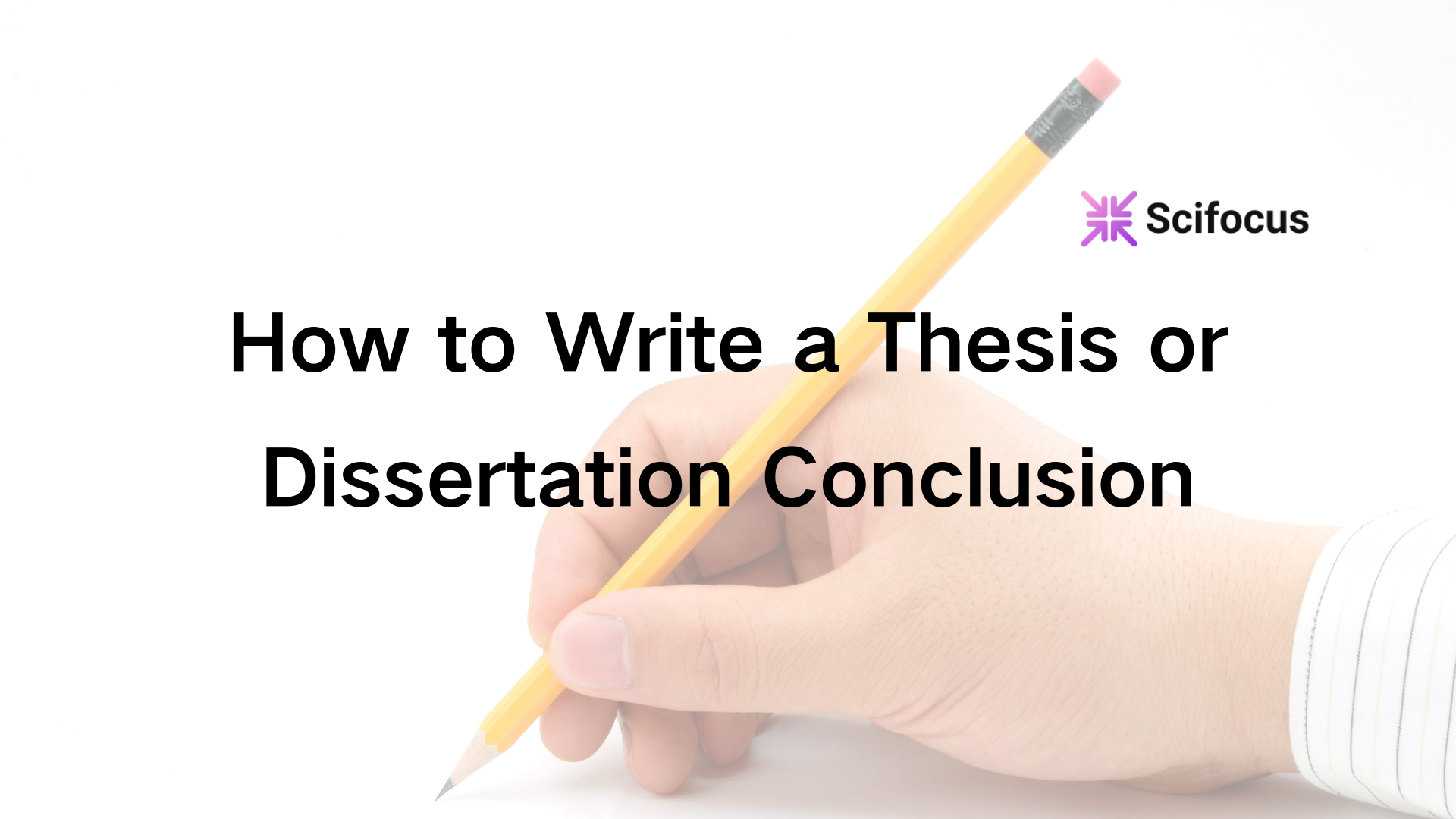How to Write a Thesis or Dissertation Conclusion?
How to Write a Thesis or Dissertation Conclusion?— You summarize what you did, explain why it matters, show how it fits into the larger field, and leave the reader with a clear sense of closure.

When you’re exhausted, anxious, and running on vending-machine coffee, those simple steps feel massive. You’re not alone. Every student hits this point where they know their thesis inside out but can’t quite compress it into something final and meaningful. This guide walks you through it slowly, kindly, and clearly.
Try Scifocus Essay Conclusion Generator here - its free.
Why Is the Thesis Conclusion So Hard to Write?
Writing the conclusion feels tough because you’re mentally exhausted, the pressure to “sound insightful” increases, and the chapter itself is less structured than the others. Many students feel a mix of relief, dread, and perfectionism as they shift from detailed analysis to big-picture synthesis. For guidance, Purdue OWL offers useful advice on effective conclusions.
To make the process easier, Scifocus Essay Conclusion Generator or other writing resources on the Scifocus homepage can significantly reduce blank-page anxiety.
What Should a Thesis Conclusion Contain?
If you’re stuck, it’s usually because you’re overcomplicating it. A clear thesis conclusion chapter generally includes:
- A brief restatement of the research problem
- A short summary of your key findings
- A final discussion of what those findings mean
- A statement of the broader significance
- Limitations (sometimes placed in discussion chapters)
- Recommendations or future research opportunities
A thesis conclusion contains the answers to the questions your thesis raised. Think of it like the last 10 minutes of a documentary: the narrative zooms out, the big ideas crystallize, and everything feels like it fits. For further conceptual clarity, the University of Southern California offers a helpful section on organizing academic research papers that echoes these principles.
If you need help summarizing complex findings, the Scifocus Essay Conclusion Generator can produce an initial summary paragraph you can refine.
How to Start a Thesis Conclusion?
Begin by answering, in one sentence,
“So what did I actually find?”
Then expand from there.
Here are warm-up starters that sound natural and not robotic:
- “This thesis set out to explore…”
- “The findings of this study suggest that…”
- “Taken together, the results demonstrate that…”
- “This research contributes to our understanding of…”
How Long Should a Thesis Conclusion Be?
The short answer: longer than one page, shorter than a chapter.
More specifically:
- Undergraduate thesis: 1–3 pages
- Master’s thesis: 3–5 pages
- PhD dissertation: 5–10+ pages (depending on discipline)
This directly addresses the common question how long should a thesis conclusion be. Humanities and social sciences tend to have longer, more interpretive conclusions. STEM dissertations may be shorter because findings are tightly defined.
Length is about function, not word count. If your conclusion feels rushed, it probably is.
How to Restate a Thesis in a Conclusion?
How to restate a thesis in a conclusion is really about shifting the framing — not rewriting the problem statement.
Example:
Original thesis:
“This study investigates how urban green spaces influence stress reduction among university students.”
Restated conclusion version:
“This research demonstrates that accessible, well-maintained green areas on campus play a measurable role in reducing student stress.”
Notice:
- Same idea
- Different wording
- New perspective (after results are known)
You’re showing how your claim held up, not repeating it.
What Is a Master’s Thesis Conclusion? (Versus a PhD Conclusion)
Master Thesis Conclusion Example (Simplified)
A master’s conclusion focuses on:
- Answering the research question
- Showing methodological competence
- Demonstrating understanding of the field
Example tone:
“This study identified three major factors influencing teacher retention… These findings contribute to existing educational research by confirming…”
It’s straightforward and practical.
PhD Thesis Conclusion Chapter Example (Simplified)
Show you’ve changed something about how the field thinks.
A PhD conclusion is broader and more ambitious. It must show:
- Clear contribution to the scholarly field
- Theoretical implications
- Originality
- A roadmap for future research
Example tone:
“This dissertation challenges existing assumptions about… By proposing an updated conceptual model, it provides a foundation for future work in…”
If you feel overwhelmed, this is normal. Many PhD writers reach this stage completely drained — but your conclusion is also where your academic voice becomes most visible.
How to Write the Recommendations or Future Work Section?
This section is often paired with the conclusion in many disciplines. If you’re wondering how to write thesis conclusion and recommendation parts effectively:
- Be realistic
- Be specific
- Tie recommendations directly to your results
- Avoid proposing things that contradict your limitations
Examples:
- “Future studies should examine larger samples…”
- “Longitudinal designs may clarify long-term effects…”
- “Additional qualitative research could explore nuances overlooked here…”
This section shows humility, self-awareness, and academic maturity.
The Most Common Mistakes Students Make in the Conclusion
Here are the top traps and easy fixes:
Introducing new data
Your conclusion is not the results section.
Fix: Move any new numbers back to earlier chapters.
Being too vague or philosophical
“Humanity must work togethera…” is not a contribution.
Fix: Focus on your data and your field.
Repeating entire paragraphs from earlier chapters
Supervisors spot this instantly.
Fix: Paraphrase and re-frame.
Ending abruptly
A one-sentence conclusion is not a conclusion.
Fix: Add closure that reinforces your contribution.
Writing like you’re apologizing for your work
Too many “may,” “might,” “could,” “limitations,” etc.
Fix: Balance humility with confidence.
If you want help smoothing tone, the Scifocus AI Humanizer can assist in making overly formal writing sound more natural.
Final Encouragement
If you feel exhausted or unsure, that’s normal. A thesis conclusion is not a test of genius — it’s the moment you step back and acknowledge everything you’ve built.
You’ve already done the hard part.
The conclusion is just the part where you help others see it.
And if you’re writing at 2 a.m., stressed and pacing around your kitchen, remember:
Every student who has ever finished a thesis has felt exactly what you’re feeling right now.
You’re almost there. Keep going.
Scifocus
If you want to make writing your thesis conclusion even easier, Scifocus offers a suite of smart academic tools designed for students like you. The Essay Conclusion Generator can help you craft clear, structured drafts in minutes, while the AI Humanizer ensures your writing feels natural, polished, and authentic. Whether you’re struggling with starting your conclusion, summarizing findings, or refining tone, Scifocus gives you practical support so you can finish your thesis confidently and efficiently.
FAQs
1. What should a thesis conclusion contain?
A restated problem, summarized findings, interpretation, contribution, limitations, and future work. No new data.
2. How long should a thesis conclusion be?
1–3 pages (undergraduate), 3–5 pages (master’s), 5–10+ pages (PhD), depending on discipline.
3. How do I start writing my thesis conclusion?
Begin with one simple sentence about your main finding, then expand.
4. How do I restate my thesis in the conclusion?
Rephrase your original aim, but reflect the knowledge gained from your results.
5. What’s the difference between a master’s and a PhD conclusion?
A master’s conclusion summarizes and contextualizes findings.
A PhD conclusion demonstrates an original contribution to the field.
Did you like this article? Explore a few more related posts.
Start Your Research Journey With Scifocus Today
Create your free Scifocus account today and take your research to the next level. Experience the difference firsthand—your journey to academic excellence starts here.
